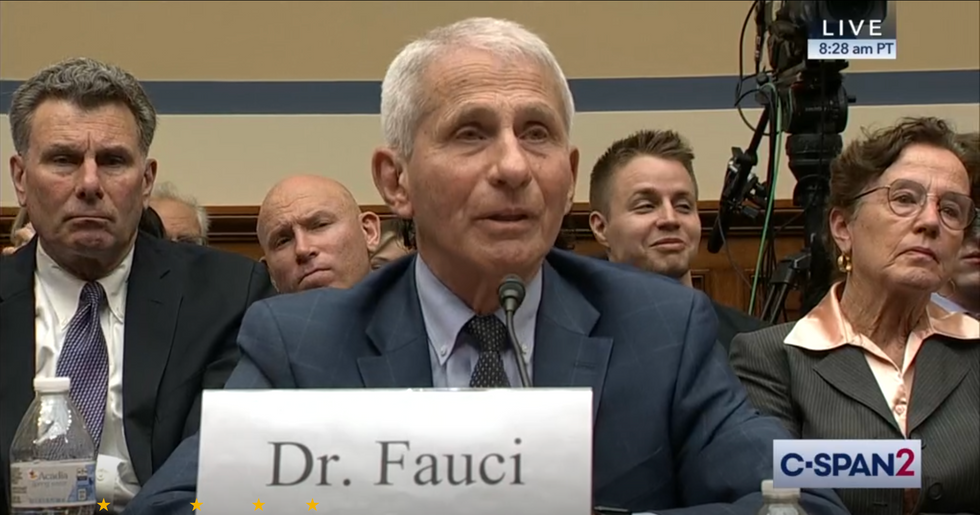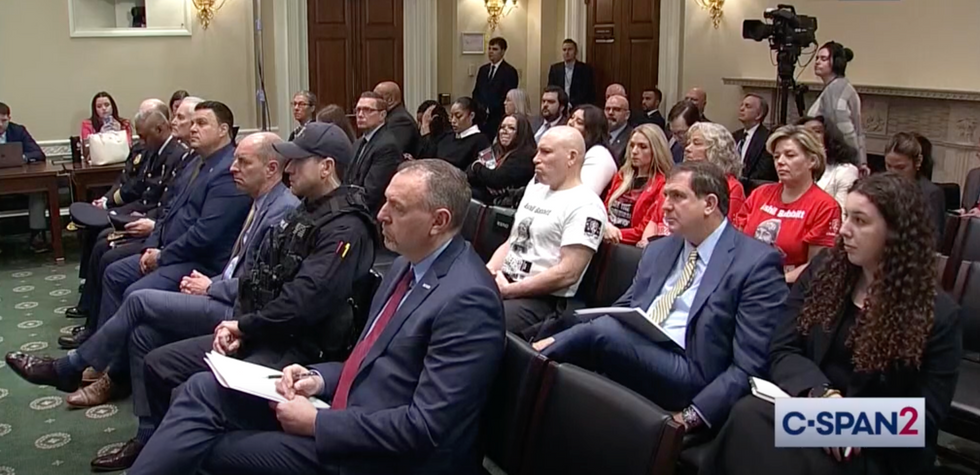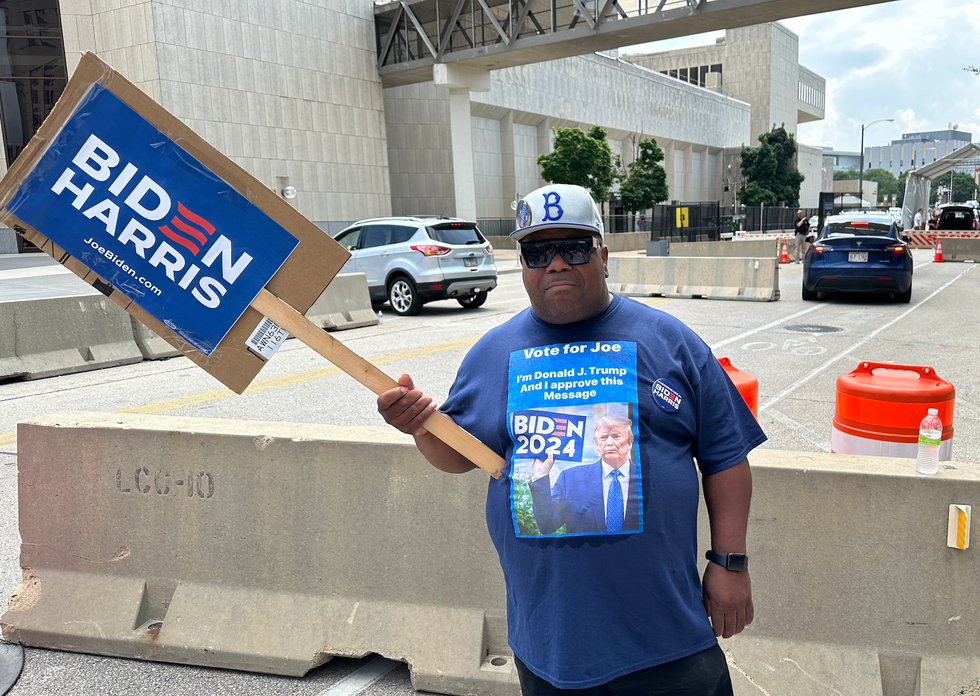Retribution is at the center of Donald Trump’s third presidential election campaign.
“I am your warrior,” Trump proclaimed earlier this year. “I am your justice, and for those who have been wronged and betrayed, I am your retribution.”
Trump’s loyal surrogates have duly embraced the project — perhaps no one more zealously than Ivan Raiklin, a retired Army Reserve lieutenant colonel and former U.S. Defense Intelligence Agency employee, who bills himself as the former and would-be president’s “future secretary of retribution.”
Raiklin is seeking to enlist so-called “constitutional” sheriffs in rural, conservative counties across the country to detain Trump’s political enemies. Or, as he says, carry out “live-streamed swatting raids” against individuals on his “Deep State target list.”
“This is a deadly serious report,” Rep. Jamie Raskin (D-MD) told Raw Story. “A retired U.S. military officer has drawn up a ‘Deep State target list’ of public officials he considers traitors, along with our family members and staff. His hit list is a vigilante death warrant for hundreds of Americans and a clear and present danger to the survival of American democracy and freedom."
READ: Trump's far-right army is threatening bloodshed — believe them
Raskin called on House Speaker Mike Johnson (R-LA) and Senate Majority Leader Chuck Schumer (D-NY) to “denounce this dangerous plot and to repudiate threats of, and planning for, political violence from any quarter. Bipartisan opposition to vigilante violence and assassination plots is essential for American government to continue.”
The list Raiklin has been circulating since January is extensive.
It includes numerous Democratic and Republican elected officials; FBI and intelligence officials; members of the House Select January 6 Committee; U.S. Capitol Police officers and civilian employees; witnesses in Trump’s two impeachment trials and the Jan. 6 committee hearings; and journalists from publications ranging from CNN and the Washington Post to Reuters and Raw Story — all considered political enemies of Trump.
Julie Farnam, a former U.S. Capitol Police employee named on the list who, as assistant director of intelligence and interagency coordination, warned about the potential for violence in advance of the Jan. 6, 2021, attack, said she would not be intimidated by the list.
“Any hit list is designed to impart the silence and fear of those named on it,” Farnam told Raw Story. “But silence is victory for those who write such lists. Conversely, speaking the truth without fear will always be the undoing of those who seek to intimidate and spread hate in our world. I can never be silenced.”
In addition to Farnam, the list includes nine current or former U.S. Capitol Police employees. The agency declined to comment for this story.
Raw Story is not publishing the full list given the potential risk posed to people unaware that they’re on it.
One individual named on the list who spoke on condition of anonymity noted that Raiklin is associated with retired Lt. General Michael Flynn.
“And Trump himself has repeated on dozens of occasions calls for revenge, retribution and retaliation,” the person told Raw Story. “This is another example of that broader phenomenon of revenge against political enemies that animates the former president and his entire movement, and for that reason should concern us all.”
The Trump campaign did not respond to emails requesting comment for this story.
‘Attack on our democracy’
The accusations of “treason” and other imagined offenses leveled by Raiklin against these individuals are typically based on fanciful legal theories and outlandish factual claims, if anything at all.
For example: Raiklin, in a podcast, suggested without evidence that the unidentified person responsible for setting pipe bombs outside the Democratic National Committee and Republican National Committee on Jan. 6, 2021, was “a subordinate-surrogate of the Capitol Police Board,” which oversees the Capitol Police.
But Raiklin is nothing if not self-assured that the “evidence” he’s gathering on anti-Trump “deep state” plotters is real. So real, it seems, that Raiklin claims the material — fully revealed — would establish probable cause for county sheriffs across the nation to issue arrest warrants for various high-ranking officials who have, in one way or another, run afoul of Trump.
Under Raiklin’s objectively bizarre plan, the sympathetic sheriffs would deputize some 75,000 military veterans — veterans he claims have been pushed out of service because they refused to comply with COVID-19 vaccine mandates — to carry out the arrests.
Raiklin has gone so far as to pitch his plan to a group of far-right sheriffs who met in Las Vegas in April.
Public records requests filed by Raw Story with dozens of county sheriff offices reveal that word of Raiklin’s efforts has reached the email inboxes of sheriffs from Wisconsin to Oklahoma.
But Raiklin’s effort to enlist these sheriffs appears to be foundering: Not one has openly signed on, and even some who are sympathetic to his cause publicly warn that his plan violates due process.
Undaunted, Raiklin has attempted to build relationships with conservative members of Congress, and aides to two Republican lawmakers who chair influential House committees confirmed to Raw Story that they are familiar with him.
An overriding reason for why Raiklin hasn’t been entirely marginalized or relegated by fellow conservatives to the realm of kooks and gadflies?
Raiklin uses the kind of hyperbolic language that Trump himself uses — and that Trump’s base eats up.
He gives federal agencies and media outlets Trump-like nicknames such as “FB-Lie,” “Faux-litico” and “National Poison Radio.”
“My nickname is the Deep State marauder, aka the mauler,” Raiklin told a group of election deniers in New Jersey earlier this year. “And I like using ice picks instead of poking the bear.”
In a video posted in May to X, which now accrued more than 10 million views, Raiklin said, “Expect to see live-streamed swatting raids of every single individual on that Deep State target list, because the precedence has already been set.”
Notwithstanding Raiklin’s claim that his plan would be “legal, moral and ethical,” swatting — the false reporting of an emergency to garner a response from law enforcement for the purpose of harassing a target — is illegal.
Raiklin has nevertheless promoted the idea in podcast interviews, multiple posts on X, a press conference and conversations with prominent far-right extremists.
In recent days, Raiklin’s rhetoric has escalated beyond setting out future hypothetical scenarios for retribution.
He mocked one former federal employee blocking him on X while suggesting that the targeted individual “wants me to speak to him in person” and asking him for his “preferred punishment for committing treason.”
And during a podcast, he claimed to be surveilling a U.S. Capitol Police employee, whom he mentioned by name, “both physically and digitally.”
Experts worry that provocative rhetoric from figures such as Raiklin could impose a climate of fear on civil servants simply trying to do their jobs. Even worse, Raiklin’s rhetoric could inspire violence against them.
“The idea that you would target anyone that was there on the basis of allegiance to the rule of law and the Constitution is really scary,” Max Stier, president and CEO of the Partnership for Public Service, told Raw Story.
Stier’s organization promotes professional, merit-based civil service as a pillar of good governance — a notion that he said is being increasingly challenged.
“This represents, in my view, an attack on our democracy,” Stier said. “We have a rule of law. If any civil servants are violating the law, there are mechanisms in place to hold them accountable. Vigilantism is not the way to have a society function.”
Raiklin responded to a phone call requesting comment by posting a recording of the voicemail on his X account on Tuesday, while commenting: “Looks like Elements of the Deep State Target List have asked @jordangreennc of Raw Sewage to try to find out more about my list….”
Later, he acknowledged a set of written questions submitted by Raw Story but didn't answer them, while accusing Raw Story and "domestic terrorist leftists" of hounding him.
"Look at my entire Deep State target list," Raiklin said. "That is the beginning. This is the scratching of the surface of who is going to be criminalized for their treason, okay?"
One prominent media organization named on Raiklin’s “target” list expressed concern for its journalists, five of whom also appear on the list by name.
“The conspiracy theories underpinning this list are baseless, and the calls for targeted harassment are dangerous,” Charlie Stadtlander, a spokesperson for The New York Times, told Raw Story. “The Times reporters on the list are simply professional journalists doing their jobs. Swatting is a criminal offense, and in the event of any instances directed at our employees, The Times will work with law enforcement to prosecute those responsible.”
Said Raw Story Publisher Roxanne Cooper: “Purposefully threatening and endangering the safety of working journalists is both reprehensible and illegal, and the American public should reject and denounce anyone who engages in such behavior.”
CNN, Reuters, The Atlantic and American Oversight declined to comment on Raiklin. Emails to the Washington Post, Politico, ABC News, NBC News and MSNBC, whose journalists are also named on the list, went unreturned.
Who is Ivan Raiklin?
As the 2020 election approached, conspiracy-minded Trump supporters with active Twitter accounts were in abundance. Most never broke through the incessant MAGA noise, or merely added another note to its election denialism dissonance.
Raiklin was different.
He was a seasoned veteran with a background in military intelligence who wound up playing a small but significant role in the effort to overturn the 2020 election in Trump’s name.
Following a distinguished career in the U.S. Armed Forces in which he served as a military attaché to the former Soviet Republic of Georgia and foreign affairs specialist assigned to the Ukraine Crisis Team, Raiklin left the Defense Intelligence Agency in 2017 to run for U.S. Senate in Virginia, according to The Washington Post.
At the time, Raiklin’s candidacy in 2018 provided little indication of the MAGA loyalist relishing the destruction of Trump’s enemies that he would become.
If anything, Raiklin fashioned himself as a force of apolitical positivity.
“The reason I’m running is that we’ve had such a negative political atmosphere the past couple years,” Raiklin told the Courier in Iowa. “I want to inject a ‘positive disruption’ in the political conversation. Being a veteran of 20 years, I’m pretty much a political agnostic.”
But Raiklin didn’t get far: He failed to garner a sufficient number of signatures to make it onto the Republican primary ballot. And when he sued the Virginia GOP and the state Department of Elections, claiming that he was unfairly excluded, a federal judge tossed out the suit.
Following his disappointing foray into electoral politics, Raiklin began his turn toward Trump’s MAGA movement.
In 2019, he appeared at a QAnon-themed fundraiser for retired Lt. Gen. Michael Flynn, Trump’s former national security adviser, whom Raiklin met in 2010. (Flynn and Raiklin have become close in recent years, with Raiklin urging Trump to select Flynn as his vice presidential running mate and Flynn featuring Raiklin in his current speaking tour.)
Roughly a week after the 2020 election, when major media outlets had called the election for Democratic candidate Joe Biden, Raiklin went on Alex Jones’ conspiracy theory show InfoWars and confidently predicted that Trump would ultimately obtain the necessary number of electoral votes to secure reelection.
“I absolutely guarantee it,” he said. “One hundred percent. Unequivocally. Full stop. There is no possibility that he does not reach 270.”
It's a classic example of how Trump’s followers often act on Trump’s wishes or anticipate his desires without receiving specific directives.
For months, Trump had been saying that the only way he’d lose the election is if Democrats stole it through fraud. Now, Trump had lost and, against all evidence, Raiklin was arguing that Trump was winning.
Raiklin, in essence, operates as an agent of Trumpism independent of Trump.
And as the 2024 election nears, the same dynamic is apparent: Trump articulates the broad themes, and his supporters scramble to put them into practice.
“Stand back and stand by” set the stage for the Jan. 6 insurrection in 2021, and now, “I am your retribution” serves as a solicitation to supporters such as Raiklin to put together specific plans for retribution against Trump’s political enemies.
‘Operation Pence Card’
Raiklin’s primary contribution to the effort to overturn the 2020 election is a memo he drafted for the benefit of Trump’s presidential campaign.
Entitled “Operation Pence Card,” it proffered a novel legal argument that Vice President Mike Pence held the authority to set aside electoral votes from states narrowly carried by Biden.
The plan is widely associated with attorney John Eastman, who now faces charges of racketeering and conspiracy in Georgia, and conspiracy, fraud and forgery in Arizona.
But Raiklin actually tweeted out his plan one day before Eastman drafted his now-infamous stop-the-steal memo. And Raiklin wielded enough influence that Trump himself, on Dec. 23, 2020, retweeted Raiklin’s “Operation Pence Card” tweet to his tens of millions of followers.
Around the same time, Raiklin dined with then-Rep.-elect Marjorie Taylor Greene (R-GA), who attended a meeting at the White House along with other House Republicans to discuss plans to object on Jan. 6 to the congressional certification of the presidential election — the final, generally ceremonial, step before a presidential inauguration.
On Jan. 4, 2021, Raiklin had told Jerome Corsi, a longtime conspiracy theorist, that, with regard to Trump supporters descending on Washington, D.C. en masse: “I am not calling for any violence, but at the same time, I can’t stop people from committing it.”
Raiklin was present at the U.S. Capitol on Jan. 6 when a pro-Trump mob breached Congress’ defenses and temporarily stopped lawmakers’ electoral vote certification. Raiklin has not been charged with any crime related to the attack.
Following the Jan. 6 attack, the Army Reserve opened an investigation into whether Raiklin violated its rules against partisan political activity, but by early 2022, the service had cleared him of wrongdoing.
Raiklin has said the U.S. Department of Justice and U.S. Department of Homeland Security have also investigated him, but those investigations likewise concluded without formal accusations of wrongdoing against Raiklin.
“So what does that trigger me to do?” Raiklin said during a presentation to a group of election deniers in New Jersey in February. “It weaponizes me against them. And so, since they haven’t found anything, and you’re investigating me, sir, I have the capability and capacity to start digging into you, your family, your friends, your associates — every single thing that you do in your life.”
Whitewashing the crimes of violent J6 rioters
While avoiding prosecution himself, Raiklin has eagerly taken up the cause of defendants who claim they were wrongfully prosecuted for their role in the Jan. 6 attack.
 Ivan Raiklin and convicted Jan. 6 offender Brandon Fellows sit behind former Chief Medical Advisor Dr. Anthony Fauci during a House subcommittee hearing in June. Courtesy C-SPAN
Ivan Raiklin and convicted Jan. 6 offender Brandon Fellows sit behind former Chief Medical Advisor Dr. Anthony Fauci during a House subcommittee hearing in June. Courtesy C-SPAN
In June, Raiklin held a press conference in Detroit to promote his “live-streamed swatting raids” scheme. He did so alongside Treniss Jewell Evans III, who served a 20-day prison sentence for illegally entering the Capitol. Also speaking at the press conference: Sarah McAbee, the wife of a former sheriff’s deputy who is currently serving a 70-month sentence for assaulting a Washington, D.C., metropolitan police officer.
Ronald Colton McAbee, Sarah McAbee’s husband, wore patches with the word “SHERIFF” and the emblem of the anti-government Three Percenter movement on his clothing while taking part in an hours-long battle at the mouth of the Lower West Terrace Tunnel on Jan. 6.
A GiveSendGo campaign to support his wife applauds McAbee for answering “the call to stand up for our nation,” but following his conviction the Department of Justice described him as witnessing rioters knock an officer defending the U.S. Capitol to the ground. McAbee’s response was the opposite of rendering aid, according to the government.
After the officer was kicked and stripped of his baton by rioters, the government contends that “McAbee stepped into the archway, grabbed the officer’s leg, and pulled him further toward the crowd. When a second MPD officer stepped off the police line to assist the downed officer, McAbee stood up, yelled at the officer who had stepped out to assist, and then swung his arms and hands towards the officer’s head and torso. McAbee made contact with the officer and was wearing the reinforced gloves at the time of the assault.”
In the run-up to Jan. 6, Raiklin had baselessly ascribed the legitimate election of Joe Biden to “domestic fraud” committed by people “potentially under foreign actors’ payroll.” Now, at the press conference in Detroit in June 2024, Raiklin was inverting the violent crimes committed by Trump supporters to portray them, not the officers defending the Capitol, as the victims.
“You need to know who is coming after us,” Raiklin said, naming two people who are part of the U.S. Capitol security apparatus. Without presenting any evidence, Raiklin accused one of the men of “weaponizing and working with the DOJ… to criminalize against Sarah’s husband.”
Cultivating relationships with House Republicans
All the while, Raiklin is forging ties with Republican lawmakers who are sympathetic to the Jan. 6 rioters.
While leveling outlandish charges of criminal misconduct at federal civil servants, Raiklin has become a familiar presence at congressional committee hearings controlled by Republican lawmakers eager to downplay the Jan. 6 attack on the U.S. Capitol or alternately, to shift blame to Democrats for the violence.
Raiklin has sat in the gallery behind the witnesses in at least five House committee hearings over the past year. Among them are the House Administration Oversight Subcommittee chaired by Rep. Barry Loudermilk (R-GA), the House Oversight and Accountability Committee chaired by Rep. James Comer (R-KY) and the House Judiciary Committee chaired by Rep. Jim Jordan (R-OH).
“I don’t just sit back behind the witnesses when I’m in the House,” Raiklin said on a podcast in May. “For 15 months, I’ve been grinding day in and day out talking to dozens of members of Congress giving ideas on what needs to be done.”
On another podcast, Raiklin said: “The only person that understands this is a guy by the name of Barry Loudermilk…. Why? Well, because he’s doing the right thing. And I get an opportunity to explain this to him and his staff regularly.”
Nick Petromelis, an aide to Loudermilk, told Raw Story he, Petromelis, is “familiar” with Raiklin.
Loudermilk ignored a request from the now-defunct House Select January 6 Committee to explain a tour he gave to constituents on the eve of the Jan. 6 attack on the Capitol. His committee deposed Farnam, the former U.S. Capitol Police intelligence leader who is on Raiklin’s target list, last month.
Austin Hacker, an aide to Comer, likewise said he, Hacker, was aware that Raiklin had attended House Oversight and Accountability Committee hearings.
Despite promising in late May that he would find out whether Comer had personally spoken to Raiklin, Hacker stopped responding to follow-up messages from Raw Story.
Raiklin said on a podcast in May that he has sent his “Deep State target list” to Comer, Jordan and the Administration Oversight Subcommittee chaired by Loudermilk.
Hacker told Raw Story that Comer, his boss, does not have the “target list” document. Aides to Jordan and the House Administration Oversight Committee did not respond to emails from Raw Story seeking confirmation that they received copies of the list.
None of the three House members responded to requests for comment about whether they support Raiklin’s antics.
 Ivan Raiklin (center, in white T-shirt) attends a congressional hearing on the Jan. 6 pipe bombs investigation held earlier this year by the House Administration Oversight Subcommittee chaired by Rep. Barry Loudermilk. Courtesy C-SPAN
Ivan Raiklin (center, in white T-shirt) attends a congressional hearing on the Jan. 6 pipe bombs investigation held earlier this year by the House Administration Oversight Subcommittee chaired by Rep. Barry Loudermilk. Courtesy C-SPAN
Raiklin has singled out other members of Congress for praise. Of Rep. Anna Paulina Luna (R-FL), who filed legislation to hold U.S. Attorney Merrick Garland in “inherent contempt,” Raiklin said she “has exhibited the maximum courage that her position allows.”
Luna’s legislation would hold the attorney general in “inherent contempt” for refusing demands to turn over audio of Special Counsel Robert Hur’s interview with Biden, related to Biden’s retention of classified documents in the garage of his Delaware home. “Inherent contempt” is a tool that would allow the House sergeant-at-arms to take Garland into custody and compel him to sit for a congressional proceeding. Raiklin told one podcaster that he “saw” Luna at a congressional hearing in May.
Luna’s office did not respond to repeated requests for comment.
‘Go to the maximum level’
While cultivating ties with members of Congress, Raiklin has been lobbying sheriffs — with mixed results — to join his effort.
To reach potentially sympathetic sheriffs, Raiklin has focused on an organization called the Constitutional Sheriffs and Peace Officers Association.
Under the leadership of Richard Mack, a former sheriff from Arizona, the Constitutional Sheriffs and Peace Officers Association has promoted the controversial view that county sheriffs are the highest law in the land and are within their rights to ignore any federal and state laws that they deem to be unconstitutional.
But Mack told Raw Story he has severed ties with Raiklin since talking with him in early June, and that he disapproves of Raiklin’s rhetoric.
During the Constitutional Sheriffs and Peace Officers Association’s annual convention during April in Las Vegas, Raiklin asked a panel of sheriffs if they would “be willing to go to the maximum level to create consequences for these federal actors” whom he claimed had committed “seditious conspiracy.”
The response was less than promising.
Still, the potential for violence should not be discounted, according to Devin Burghart, executive director of the Institute for Research & Education on Human Rights and someone who has been monitoring the far right for more than three decades.
“It is certainly not out of the realm of possibility to see them using the office of the sheriff and posses they wish to create to start rounding up political opponents,” Burgart told Raw Story. “Right now, in the far right, the promotion of post-election violence and bloody political retribution has become disturbingly commonplace. In that context, the results of the election are almost an afterthought — only important in determining whether their murderous rage will have state sanction.”
While the far-right’s willingness to escalate may increase as the election approaches, at the time of the Constitutional Sheriffs and Peace Officers Association convention in April, the two elected sheriffs on the panel were taking a cautious approach.
Sheriff Bob Songer from Klickitat County in Washington state told Raiklin that, as much as he might want to help, he doubted many prosecutors would be willing to press charges.
Sheriff Dar Leaf from Barry County in Michigan put it more forcefully.
“We’re not going to be able to just go out and arrest,” he said. “We’ve got to do a grand jury indictment, just like the Constitution says.”
Leaf’s far-right credentials would seem to make him a prime candidate for Raiklin’s project. He gained national notoriety in 2020 when he suggested that members of an anti-government militia accused of attempting to kidnap Michigan Gov. Gretchen Whitmer might have been trying to carry out a citizen’s arrest.
Leaf has falsely claimed that there was widespread fraud in the 2020 election, and a lawyer representing Leaf reportedly sought evidence from an ad hoc group organized by lawyer Sidney Powell and Michael Flynn in December 2020 that could be used to justify “issuing probable cause warrants to sequester Dominion voting machines.”
But if Raiklin and his allies were discouraged by Leaf’s response at the Constitutional Sheriffs and Peace Officers Association convention, they haven’t given any indication of it.
During a podcast appearance with Mark Finchem, a former Arizona state representative who took part in the effort to overturn the 2020 election, Raiklin said he was certain that the Constitutional Sheriffs and Peace Officers Association could help “identify which county sheriffs would be clamoring, clamoring to prosecute these scum.”
“I know one,” Finchem replied. “Dar Leaf in Barry County, Michigan.”
Reached by Raw Story earlier this month, Leaf said that despite fielding a question from him at the Constitutional Sheriffs and Peace Officers Association convention, he doesn’t know who Raiklin is.
Leaf reiterated his rejection of Raiklin’s plan by expressing an aversion to politically motivated prosecutions.
Furthermore, Leaf warned that if indictments were obtained through grand juries “stacked” with Trump supporters, any criminal activity uncovered through depositions would be thrown out “because we started out breaking the law.”
Among dozens of other sheriff’s offices across the country contacted for this story, two in Wisconsin — Burnett County and Polk County — confirmed receiving an email with the subject heading: “Ivan Raiklin Requests Deputization of 80K Veterans” that linked to Raiklin’s video and encouraged them to get in contact.
“Please Watch this viral video that has garnered 9.8M views in 5 days,” it reads. “Important you understand. Remember your Oath.”
Raiklin’s name landed in one other sheriff’s inbox through a subscription to the “General Flynn Newsletter,” which is promoting the documentary about the former national security adviser.
The email, received by Tulsa County Sheriff Vic Regalado in Oklahoma, describes Raiklin as a member of a team “hand-selected” by Flynn to provide event attendees “with an informative and unforgettable experience.”
The email describes the “General Flynn was Framed Evidence Wall,” a visual prop that Raiklin uses prior to each film screening that presents “an exhaustive timeline and link analysis of all the major political and government officials at the most senior levels that weaponized against General Flynn to prevent him from exposing their corruption.”
During his months-long campaign, Raiklin has continuously referenced Mack and the Constitutional Sheriffs and Peace Officers Association in an effort to build credibility for his plan.
During his press conference with Treniss Evans in Detroit, Raiklin mentioned that the previous evening he’d “had a very long conversation with a guy by the name of Sheriff Mack” on the topic of “vetting and communicating with sheriffs.”
On a livestream of the press conference, Raiklin displayed a photo of the two men huddling over a laptop, suggesting a collaborative effort.
In a recent interview, Mack told Raw Story at the time that he had been “getting all sorts of calls” about Raiklin.
But since that meeting, Mack said he has soured on Raiklin’s plan.
“I’m afraid I don’t approve of some of his language, the hyperbole, the rhetoric,” Mack said.
For the same reason, Mack said, he resigned from the Oath Keepers. Stewart Rhodes, the founder of the far-right group that recruited from the ranks of retired law enforcement and military veterans, is currently serving an 18-year prison sentence for seditious conspiracy at a federal prison in Cumberland, Md.
“It’s not where CSPOA can go,” Mack said, adding that he and Raiklin “are not working together at all.”
Since early June, Mack said that the two men have not spoken or exchanged any emails.
“Quite frankly, he talks about that list of 350 people — I’m sure they can afford lawyers,” Mack said. “It reeks of lawsuits, and it doesn’t follow due process.”
During his press conference with Evans, Raiklin said the two men are planning to attend the Sheriffs Association of Texas’ annual conference in Fort Worth, Texas, this month and pitch their plan.
“I would say that my inbox has been interesting lately with the amount of sheriffs that have an interest in seeing Texas uphold the United States Constitution, and preserve the way of life that we’ve come to expect as constitutionally guaranteed,” Evans said during the press conference.
But Mack said Raiklin’s score is currently 0.
“I know a lot of sheriffs, especially in Texas,” Mack told Raw Story. “I do not believe he has a single sheriff aligned with him. He’s never been able to give me a name.”
‘It’s so easy to learn where they live’
While cultivating relationships with members of Congress, lobbying sheriffs and recruiting volunteers to join posses tasked with detaining political enemies, Raiklin has also forged relationships with other extremists, seeming to cast about for a legal rationale in support of his scheme.
Over the past six months, Raiklin has appeared on at least three podcasts with Dr. Pete Chambers, who helped organize a “Take Our Border Back” convoy earlier this year to support Texas Gov. Greg Abbott’s defiance of the federal government.
Like Raiklin, Chambers is a retired lieutenant colonel who formerly served in the Army Special Forces. Following his retirement from the military and later, in 2022, from the National Guard, Chambers joined the “sovereign citizen” group Republic of Texas, whose members shot a man and took him hostage in 1997.
Chambers said when he watched Raiklin’s viral video outlining his plan to carry out “live-streamed swatting raids” against his “Deep State target list,” he recalled that he said to himself: “Ivan, you’ve just kicked open the door, and we’re going to have to back your play. And we can. And we’ve got the receipts to do it.”
During the conversation between the two men, Chambers referenced something called “the doctrine of lesser magistrates.” Although the term is rooted in the 16th century Protestant Reformation in Europe, it was more recently popularized by Matthew Trewhella, a Wisconsin pastor who has advocated killing abortion doctors.
Michael Flynn has recommended Trewhella’s 2013 book, The Doctrine of the Lesser Magistrates: A Proper Resistance to Tyranny and a Repudiation of Unlimited Obedience to Civil Government, as “a masterful blueprint showing Americans how to successfully resist tyranny.”
Trewhella’s book also received a plug at the Constitutional Sheriffs and Peace Officers Association convention where Raiklin attempted to sell the sheriffs on his “live-streamed swatting raids” plan.
Chambers seemed to acknowledge the improvisational nature of applying a 16th century religious doctrine to an ideological battle with Trump’s political adversaries in the United States of America in 2024.
“We’re building a plane and flying it here, I would say,” he said. “However, it is legal, moral and ethical…. If we can get together and develop the alliances of these sheriffs, then we decrease the space that these people can then maneuver.”
‘Gonna face those guns’
Next week, barring something cataclysmic, Trump will officially become the Republican Party’s 2024 presidential nominee.
Trump will become the nominee despite being convicted of 34 felonies in the Stormy Daniels hush-money case in Manhattan, and he still faces dozens of additional federal and state charges despite a recent Supreme Court ruling that granted Trump — and any future president — immunity from criminal prosecution for “official acts” they took as president.
Trump is as defiant as ever.
“I did nothing wrong. We’d have a system that was rigged and disgusting. I did nothing wrong,” Trump said June 27 in his debate against Biden.
On a parallel track, Raiklin’s embrace of lawlessness appears to be growing stronger.
In June, Raiklin published a 76-minute video of himself speaking with Cliven Bundy, a 78-year-old Nevada rancher who is perhaps the ultimate icon of the far-right anti-government movement. In 2014, Bundy’s refusal to pay grazing fees to the U.S. Bureau of Land Management led to an armed standoff between the FBI and militia members, along with other supporters, including Richard Mack from the CSPOA.
Raiklin flattered Bundy during the exchange as “quite the legend,” while describing the federal government as “the most corrupt institution on the planet.” The two men agreed that “the militia” — a term used to describe armed citizens — “puts a check on the federal government.”
The rhetoric used by the two men became increasingly confrontational, with Bundy accusing the federal government of plotting to kill Americans. Cliven Bundy noted that his son, Ryan Bundy, was wounded, and a friend, LaVoy Finicum, was killed during a traffic stop during the Malheur National Forest occupation in Oregon in 2016.
“They don’t have those bullets to fight our enemy across the border,” Bundy charged. “They’ve got those bullets to kill us in America.”
Raiklin then quoted the Bible to suggest the proper response was “an eye for an eye.”
Bundy lamented that sheriffs across the country did not heed his call in 2014 for them to disarm federal agents in their jurisdictions.
“I said, ‘If you don’t disarm them, one of these days you’re going to face those guns,’” Bundy recounted.
“Now, we’re getting closer,” he quickly added. “Gonna face those guns.”
Raiklin, in response, appeared to advocate for doxing federal agents.
“Oh yeah, we’re not only going to do that,” he said. “Again, they’re going to experience the most peaceful, legal and moral, ethical and patriotic endeavor they’ve ever experienced in their life. Every one of them. Because we have tens, if not hundreds of thousands of people that will facilitate them experiencing that.
“Because it’s so easy to learn where they live,” Raiklin continued. “Each one. Where their homes are. Who they’re related to. Where they frequent. What kinds of vehicles they own. What kinds of devices they own and that they emit GPS geo-tracking data. Which social media apps they use. We monitor all their communications.”
NOW READ: Trump's far-right army is threatening bloodshed — believe them
 Sara Brady (left) and Idaho state Sen. Tammy Nichols talk about their dresses at the Republican National Convention.(Jordan Green / Raw Story)
Sara Brady (left) and Idaho state Sen. Tammy Nichols talk about their dresses at the Republican National Convention.(Jordan Green / Raw Story)


 Pastor James Roemke conducting a prayer on Monday at the Republican National Convention. (C-SPAN)
Pastor James Roemke conducting a prayer on Monday at the Republican National Convention. (C-SPAN) Rep. Nancy Mace (R-SC) at the Republican National Convention on Wednesday. (C-SPAN)
Rep. Nancy Mace (R-SC) at the Republican National Convention on Wednesday. (C-SPAN) Lee Greenwood merchandise for sale at the Baird Center in Milwaukee. (Mark Alesia/Raw Story)
Lee Greenwood merchandise for sale at the Baird Center in Milwaukee. (Mark Alesia/Raw Story) Bibles being sold with photos and autographs from Lee Greenwood. (Mark Alesia/Raw Story)
Bibles being sold with photos and autographs from Lee Greenwood. (Mark Alesia/Raw Story) Gail Weiss, Steven Leventhal and Jodi Schwartz — Jewish supporters of Donald Trump who attended the Republican National Convention in Milwaukee during July 2024 — said they've always felt welcome within the party and lauded its support for
Gail Weiss, Steven Leventhal and Jodi Schwartz — Jewish supporters of Donald Trump who attended the Republican National Convention in Milwaukee during July 2024 — said they've always felt welcome within the party and lauded its support for  A delegate to the Republican National Convention walks past horn-honking clown Steve May of Washington state, who, with two friends dressed as clowns, protested Donald Trump just outside the convention's security zone.(Mark Alesia/Raw Story)
A delegate to the Republican National Convention walks past horn-honking clown Steve May of Washington state, who, with two friends dressed as clowns, protested Donald Trump just outside the convention's security zone.(Mark Alesia/Raw Story) Pat Spellacy from Arizona hands an anti-Trump pedestrian a clown nose just outside the security zone of the Republican National Convention.(Mark Alesia/Raw Story)
Pat Spellacy from Arizona hands an anti-Trump pedestrian a clown nose just outside the security zone of the Republican National Convention.(Mark Alesia/Raw Story) Trucks lined up on a street just outside the security zone at the Republican National Convention.(Mark Alesia/Raw Story)
Trucks lined up on a street just outside the security zone at the Republican National Convention.(Mark Alesia/Raw Story) Sign in the window of a spice food company whose headquarters is in Wisconsin and is unabashed about its politics.(Mark Alesia/Raw Story)
Sign in the window of a spice food company whose headquarters is in Wisconsin and is unabashed about its politics.(Mark Alesia/Raw Story) Lady with a sign on a hanger protests outside the security zone of the Republican National Convention.(Mark Alesia/Raw Story)
Lady with a sign on a hanger protests outside the security zone of the Republican National Convention.(Mark Alesia/Raw Story) Car on street with a protest outside the security zone of the Republican National Convention.(Mark Alesia/Raw Story)
Car on street with a protest outside the security zone of the Republican National Convention.(Mark Alesia/Raw Story) Truck sponsored by People for the American Way reminds people what Republican vice presidential candidate J.D. Vance once said about Donald Trump.(Mark Alesia/Raw Story)
Truck sponsored by People for the American Way reminds people what Republican vice presidential candidate J.D. Vance once said about Donald Trump.(Mark Alesia/Raw Story) Protestor outside entrance for cars into the security zone for the Republican National Convention.(Mark Alesia/Raw Story)
Protestor outside entrance for cars into the security zone for the Republican National Convention.(Mark Alesia/Raw Story) Spanish language protest truck says, "Wisconsin it's time to reject Trump's agenda. Prohibit access to abortion and contraceptives at the national level. Separate thousands of families through mass deportations. Raise taxes on working communities and exempt the rich from taxes.”(Mark Alesia/Raw Story)
Spanish language protest truck says, "Wisconsin it's time to reject Trump's agenda. Prohibit access to abortion and contraceptives at the national level. Separate thousands of families through mass deportations. Raise taxes on working communities and exempt the rich from taxes.”(Mark Alesia/Raw Story) Advertising for a protest march during the Republican National Convention in front of the Wisconsin Republican Party Community Center in Milwaukee. Mark Alesia/Raw Story
Advertising for a protest march during the Republican National Convention in front of the Wisconsin Republican Party Community Center in Milwaukee. Mark Alesia/Raw Story A woman in Milwaukee stands in silence as she watches coverage of the shooting at a Trump rally. (Matt Laslo /
A woman in Milwaukee stands in silence as she watches coverage of the shooting at a Trump rally. (Matt Laslo /  Billboard in Milwaukee, site of the Republican National Convention. (
Billboard in Milwaukee, site of the Republican National Convention. ( Billboard in Milwaukee from Think Big America, the political action committee of Illinois governor J.B. Pritzker. (Raw Story photo)
Billboard in Milwaukee from Think Big America, the political action committee of Illinois governor J.B. Pritzker. (Raw Story photo) Anti-Joe Biden billboard in Milwaukee paid for by the Republican National Committee. (Raw Story photo)
Anti-Joe Biden billboard in Milwaukee paid for by the Republican National Committee. (Raw Story photo) Billboard in Milwaukee paid for by Women's Declaration International, USA, a pro-abortion rights group. (Raw Story photo)
Billboard in Milwaukee paid for by Women's Declaration International, USA, a pro-abortion rights group. (Raw Story photo) Pro-Trump billboard in Milwaukee sponsored by personal injury attorney Dan Newlin, a major Trump supporter from Orlando, Fla. . (Raw Story photo)
Pro-Trump billboard in Milwaukee sponsored by personal injury attorney Dan Newlin, a major Trump supporter from Orlando, Fla. . (Raw Story photo) Billboard in Milwaukee paid for by the Republican National Committee. (Raw Story photo)
Billboard in Milwaukee paid for by the Republican National Committee. (Raw Story photo) Billboard in Milwaukee paid for by Penzeys Spices, a food spice company that is headquartered in Wauwatosa, Wis., a Milwaukee suburb. (Raw Story)
Billboard in Milwaukee paid for by Penzeys Spices, a food spice company that is headquartered in Wauwatosa, Wis., a Milwaukee suburb. (Raw Story) Billboard in Milwaukee from the political action committee of Illinois Gov. J.B. Pritzker. (Raw Story photo)
Billboard in Milwaukee from the political action committee of Illinois Gov. J.B. Pritzker. (Raw Story photo) Billboard in Milwaukee says, "Democrats are coming for your children, your car, and your money. Vote Republican." (Raw Story photo)
Billboard in Milwaukee says, "Democrats are coming for your children, your car, and your money. Vote Republican." (Raw Story photo) A Department of Transportation sign on the north side of Milwaukee credits the Infrastructure Law signed by President Joe Biden for paying for road improvements. (Raw Story photo)
A Department of Transportation sign on the north side of Milwaukee credits the Infrastructure Law signed by President Joe Biden for paying for road improvements. (Raw Story photo) Billboard advertising The Epoch Times, a conservative news organization. (Raw Story photo)
Billboard advertising The Epoch Times, a conservative news organization. (Raw Story photo) Pro-Trump billboard in Milwaukee sponsored by attorney Dan Newlin. (Raw Story photo)
Pro-Trump billboard in Milwaukee sponsored by attorney Dan Newlin. (Raw Story photo) Billboard in Milwaukee says, "Two-faced Teamsters? 99% of dues spent on political advocacy went to the left. Learn more at Unionfacts.com." The billboard is sponsored by the Center for Union Facts, an anti-union nonprofit organization. (Raw Story photo)
Billboard in Milwaukee says, "Two-faced Teamsters? 99% of dues spent on political advocacy went to the left. Learn more at Unionfacts.com." The billboard is sponsored by the Center for Union Facts, an anti-union nonprofit organization. (Raw Story photo) Ivan Raiklin and convicted Jan. 6 offender Brandon Fellows sit behind former Chief Medical Advisor Dr. Anthony Fauci during a House subcommittee hearing in June. Courtesy C-SPAN
Ivan Raiklin and convicted Jan. 6 offender Brandon Fellows sit behind former Chief Medical Advisor Dr. Anthony Fauci during a House subcommittee hearing in June. Courtesy C-SPAN Ivan Raiklin (center, in white T-shirt) attends a congressional hearing on the Jan. 6 pipe bombs investigation held earlier this year by the House Administration Oversight Subcommittee chaired by Rep. Barry Loudermilk. Courtesy C-SPAN
Ivan Raiklin (center, in white T-shirt) attends a congressional hearing on the Jan. 6 pipe bombs investigation held earlier this year by the House Administration Oversight Subcommittee chaired by Rep. Barry Loudermilk. Courtesy C-SPAN Email from the National Republican Senatorial Committee.
Email from the National Republican Senatorial Committee. Part of a Biden-Harris 2024 political campaign fundraising pitch on May 30, 2024. (Source: Biden-Harris 2024)
Part of a Biden-Harris 2024 political campaign fundraising pitch on May 30, 2024. (Source: Biden-Harris 2024) Trump and his private Boeing 757. Mandel Ngan/AFP
Trump and his private Boeing 757. Mandel Ngan/AFP